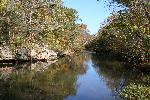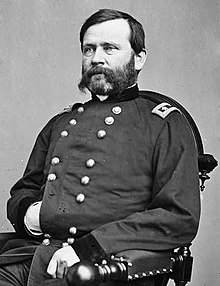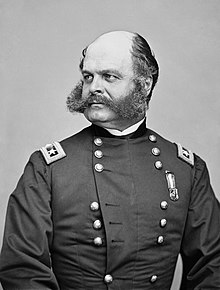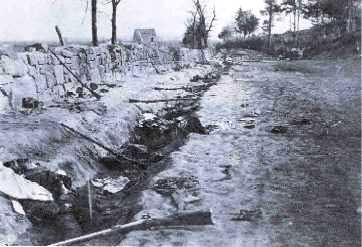 |
| General George H. Thomas |
WAR DEPARTMENT,
Washington City, D. C.,
December 30, 1862-3.30 p.m.
Major-General BURNSIDE:
I have good reason for saying you must not make a general movement of the army without letting me know.
A. LINCOLN.
HEADQUARTERS ARMY OF THE POTOMAC, December 30, 1862.
The PRESIDENT OF THE UNITED STATES:
Your dispatch is received. I have rescinded some orders that had already
been given. I am summoned to give evidence in court-martial to-morrow
at Washington, and will see you.
A. E. BURNSIDE,
Major-General.
HEADQUARTERS THIRD DIVISION,
Near Stewartsborough
, December
30 1862-1 a.m.
Major-General THOMAS:
GENERAL: Shall I order Colonel Starkweather back in the morning, and, as the
night is inclement, and had I not better defer marching from this camp till
daylight? It is now 1 a.m.
Very truly, &c.,
LOVELL H. ROUSSEAU,
Major-General.
[Indorsement.]
General ROUSSEAU:
General Thomas has been absent since morning, and I do not know how
important it is for troops to follow. I received an order from him to-night to
follow him at early dawn. You will use our own discretion in regard to
marching. I understand the enemy is leaving, or have left Murfreesborough, and
that our troops are pursuing.
Very respectfully, your obedient servant,
GEO. E. FLYNT,
Assistant Adjutant-General.
HEADQUARTERS DEPARTMENT OF THE CUMBERLAND,
Camp near La Vergne,
December 29,
1862-1.50 a.m.
Colonel WALKER,
Commanding First Brigade, First Division, Center, Nolensville:
A cavalry reconnaissance made this evening has developed the presence of the
enemy (apparently heavy force) at the ford of Stewart's Creek, 2 miles in
advance of the outposts of our right. Such being the case, the general desires
you to be wary, guarding well your front and exposed flank.
I am, colonel, very respectfully, your obedient servant,
J. P. GARESCHE,
Assistant Adjutant-General and Chief of Staff.
DECEMBER 30, 1862.
Major-General ROSECRANS:
I am going to General Negley's headquarters. I will probably see General
McCook. What shall I tell him?
GEO. H. THOMAS,
Major-General, Commanding.
HEADQUARTERS FOURTEENTH ARMY CORPS,
December 30, 1862.
Major-General THOMAS:
Tell him to report to me the nature of the country in front of him; the
progress made; the routes. How long will you be gone?
ROSECRANS,
General, Commanding.
DECEMBER 30, 1862.
General ROSECRANS:
General McCook is up with two divisions in line.
THOMAS,
General.
DECEMBER 30, 1862.
General THOMAS:
I have been trying all day to get up communication with him.
ROSECRANS.
DECEMBER 30, 1862.
General ROSECRANS:
We have repulsed the enemy. Sheridan's
division is up with Negley.
GEO. H. THOMAS,
Major-General, Commanding.
[DECEMBER 30, 1862.]
General NEGLEY:
You will move on and keep even with General Crittenden's advance, and have
camp ready to move at any time.
THOMAS,
General.
HEADQUARTERS CENTER,
FOURTEENTH ARMY CORPS,
December
30, 1862.
General ROSECRANS:
I have ordered General Negley to push the enemy as far as possible.
GEO. H. THOMAS,
Major-General, Commanding.
HEADQUARTERS FOURTEENTH ARMY CORPS, December
30, 1862.
Major-General THOMAS:
That's right.
ROSECRANS.
HEADQUARTERS CENTER,
FOURTEENTH ARMY CORPS,
DEPARTMENT OF THE CUMBERLAND,
Camp before Murfreesborough,
December
30, 1862.
Brigadier-General NEGLEY:
Make arrangements to hold your position as you are. If your troops are too
far advanced, draw them in a little. Keep out strong skirmishing parties, and
be prepared to advance early to-morrow morning. General Thomas has gone to his
camp, back 1 mile, but will see you in person before you advance.
Very respectfully, your obedient servant,
[GEO. E. FLYNT,]
Major and Chief of Staff.
HEADQUARTERS SECOND DIVISION,
LEFT WING, FOURTEENTH ARMY CORPS,
In the Field,
December 30, 1862.
Colonel HAZEN,
Commanding Second Brigade:
The order of battle and of march to-day, as suggested by General Rosecrans,
is that there shall be intervals between the first and second lines of advance
brigade of about 300 yards. General Cruft and Colonel Grose, will immediately
examine the ground, to see if such positions can be found for their rear lines
as will afford that interval, and, if possible, will withdraw them. This is
only important in case of a battle himself ready to move in any direction, and
will gradually gain the interval between the leading brigades, holding himself
in proper supporting distance. Second line will not be advanced until
absolutely needed, and will then be used to relieve or support exhausted men.
Fight by brigades.
By order of Brigadier-General Palmer:
D. W. NORTON,
Acting Assistant Adjutant-General.
HEADQUARTERS IN THE FIELD,
December
30, 1862-9.50 a.m.
Lieutenant-General POLK:
GENERAL: The dispatch of General Wharton is received. The general commanding
directs me to say that the indications of the enemy now are to cross the river
in front of General Hardee.
GEORGE WM. BRENT,
Assistant Adjutant-General.
HEADQUARTERS DEPARTMENT OF THE CUMBERLAND,
December 30, 1862-11
a.m.
Major-General THOMAS:
Firing heard in the direction of Jefferson. Have sent
to ask Rousseau if brigade there has been withdrawn, and to order it back if it
has left, unless there is a strong regiment left there. Write a note to Walker,
which I will send by courier, to come up as soon as possible.
By command of Major-General W. S. Rosecrans:
C. GODDARD,
Major and Acting Assistant Adjutant-General.
HEADQUARTERS,
December 30,
1862-12.46 p.m.
Major-General THOMAS:
It seems there is some delay in the movements of McCook. Until the fight is
south, Negley ought not to separate from him.
By command of Major-General W. S. Rosecrans:
FRANK S. BOND,
Acting Aide-de-Camp.
HEADQUARTERS THIRD DIVISION,
December
30, 1862-1.30 p.m.
Major GEORGE E. FLYNT:
Colonel Starkweather, at 10.30 a.m. to-day, sent dispatch (just reached me)
saying he was attacked in force, and it would not do to leave one regiment
alone at Jefferson Crossing; it would be captured, and he awaited further
orders; that a part of his train had been captured; that the enemy was reported
3,000 strong on the opposite side of the river, but that half that number was
probably correct; that he had lost some men. Inclosed you have dispatch from
General Rosecrans, in answer to which I inclosed Colonel Starkweather's report,
deeming it necessary to give to him an immediate reply, with such information
as I had; but my dispatch was directed to you or Colonel Garesche. If you
receive it, will you please forward it to General Rosecrans, and I will make no
further reply to him.
Very respectfully,
LOVELL H. ROUSSEAU,
Major-General.
[Indorsement.]
Received in answer to a dispatch from General Wharton, announcing that the
enemy's right did not extend as far as our left at 10.25 a.m.
DECEMBER 30, 1862-2.30
p.m. [Received 2.45 p.m.]
Lieutenant-General POLK:
GENERAL: I have three regiments in the enemy's rear; the remainder are held
to prevent a movement on our left. As yet the enemy are not farther left than
Manigault's center. As soon as they develop their left I will do all I can to
ruin them in their rear. General Cheatham will be advised promptly.
Respectfully,
JNO. A. WHARTON,
Brigadier-General.
HEADQUARTERS ARMY OF TENNESSEE,
Murfreesborough, December 30,
1862-1.50 p.m.
[Major-General WITHERS:]
GENERAL: The general commanding directs that a vigorous assault be made by
our left on the right of the enemy to-morrow morning as early as it is light
enough to see. Your right will remain stationary, and be the pivot on which the
movement will be made. Your left will swing around and correspond with the
movement of General McCown's division on your left. In making this movement,
the general desires that your attack shall be vigorous and persistent. In so
doing, keep up the touch of elbows to the right, in order that the line may be
unbroken. The movement of the second line will correspond with that of the
first.
Very respectfully,
GEORGE WM. BRENT,
Assistant Adjutant-General.
HEADQUARTERS CENTER,
FOURTEENTH ARMY CORPS,
DEPARTMENT OF THE CUMBERLAND,
Camp before Murfreesborough,
December
30, 1862.
Major-General ROUSSEAU,
Commanding Third Division:
Move with your command at 6 o'clock
to-morrow morning to the ground occupied by General Crittenden on the night of
the 29th, 1862, and await orders from General Thomas. Send orders to Colonel
Starkweather to join his division as soon as relieved by General Stanley, but
on no account to move unless relieved.
Very respectfully, your obedient servant,
[GEO. E. FLYNT,]
Major and Chief of Staff.
HEADQUARTERS CENTER,
FOURTEENTH ARMY CORPS,
DEPARTMENT OF THE CUMBERLAND,
Camp before Murfreesborough,
December
30, 1862.
Colonel M. B. WALKER,
Commanding First Brigade:
March with your brigade on the Murfreesborough pike join
Major-General Rousseau's division as soon as relieved by General Stanley's troops. In case you do not see the general commanding on your arrival, you
will take position in rear and to the left of Rousseau's command, to act as a
reserve, or to attack, if necessary. Bring forward your train and park it with
Rousseau's, and furnish your men with two days' rations in haversacks.
Very respectfully, your obedient servant,
[GEO. E. FLYNT,]
Major and Chief of Staff.
OFFICE CHIEF OF POLICE,
Nashville,
December 30, 1862.
Major-General ROSECRANS:
C. H. Ball and Miss Collins, whom I had sent to Murfreesborough Friday
night, by way of Lebanon, just in. On their way all troops were moving toward
Murfreesborough. Were in Murfreesborough from Saturday nigh to Sunday, at 1 p.m. Found troops moving out toward La
Vergne, evidently concentrating on Murfreesborough, drawing in right and left
wings. General Bragg himself said that his force was 60,000, well armed and
clothed. Were loading munitions of war in large amounts on railroad cars. No
fortifications. Left there at 1 p.m.
Sunday, on Shellbyville pike. Passed train of 29 wagons of flour, going into
Murfreesborough. All their wagon transportation concentrated in
Murfreesborough, loaded and loading. Was informed by Major McConnico, in
personal conversation, that they had about 40,000 troops. These officers
informed me that they should probably retreat back to the flat lands below
Murfreesborough, and there could easily outflank the Federals.
WM. TRUESDAIL,
Chief of Police.
HEADQUARTERS RIGHT WING, December
30, 1862.
General DAVIS,
Commanding First Division, Right Wing:
The following will be the programme to-morrow: If the rebels attack you in
the morning, you must refuse your right, and fall back slowly, contesting the
ground inch by inch, and fight as well as the rebels fought you to-day. If they
do not attack you, you will attack warmly, not vigorously. General Crittenden's
corps will cross the river and take Murfreesborough, and attack any force in
rear that falls in front of him, and try and work on the line in your front. Be
sure that each and every one of your brigade commanders understand the orders.
The time of the attack on our side will be designated. I will go over to see
General Rosecrans to-night.
By command of Major-General McCook:
G. P. THRUSTON,
Ordnance Officer and Acting Aide-de-Camp.
Official Records, Series I., Vol. 21, Part 1, Page 900...Series I., Vol. 20, Part 2, Pages 271, 275-280, 469.
Generals Newton and Cochrane had gone to see the President and indicated in its demoralized state the Army of the Potomac could not effectively fight. The leadership of the Army of the Potomac was, in the aftermath of McClellan's removal, divided and ineffective.
In Tennessee Rosecrans is forming his army into a line parallel to that of Bragg's. The various dispatches indicate how difficult the task of a battlefield commander was in bringing an army onto the field in proper position.






.jpg/220px-Gen._John_Morgan_(cropped).jpg)






